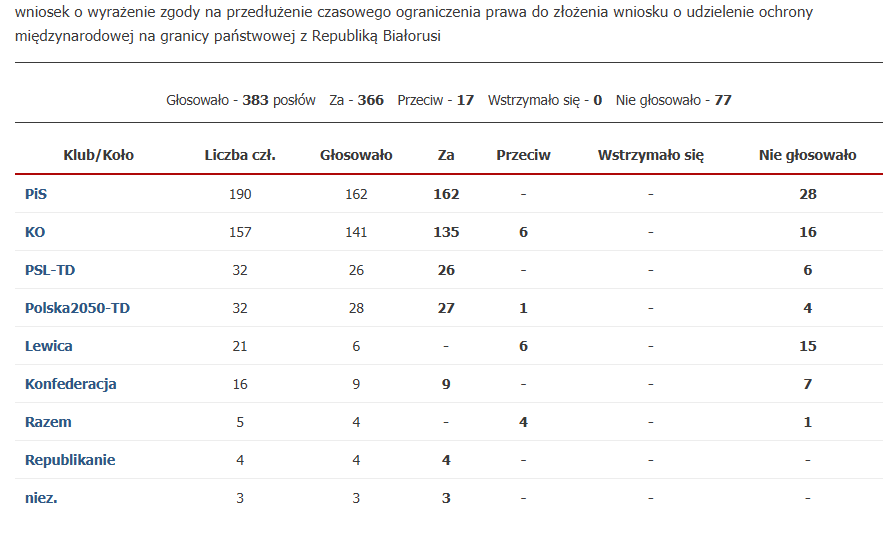Keep our news free from ads and paywalls by making a donation to support our work!

Notes from Poland is run by a small editorial team and is published by an independent, non-profit foundation that is funded through donations from our readers. We cannot do what we do without your support.
Poland’s parliament has voted almost unanimously to extend the suspension of the right to claim asylum for migrants who cross the border from Belarus. The measure received support from every political group apart from the left.
In March, President Andrzej Duda signed into law a bill allowing the government to suspend the right to claim asylum for people who enter the country as part of the “instrumentalisation of migration” by Belarus and Russia. The government then immediately introduced such a ban.
However, the measure can only be in place for an initial 60 days, after which any extension must be approved by the Sejm, the more powerful lower house of parliament.
Earlier this week, Prime Minister Donald Tusk submitted a request to the Sejm for a 60-day extension. On Wednesday morning, it was approved by parliament, with 366 votes in favour and only 17 against.

How MPs from various parliamentary caucuses voted on extending the asylum ban (za = for, przeciw = against, nie głosowało = did not vote)
As happened when the law in question was originally passed, The Left (Lewica), which is part of Tusk’s ruling coalition, voted against the extension (although 15 out of their 21 MPs were absent from the vote). Together (Razem), a small left-wing party that split from the ruling camp last year, was also opposed.
Arkadiusz Sikora, an MP from The Left, said during the debate preceding the vote that, even though Belarus and Russia are engineering “mass, illegal transfer of citizens of other countries to our territory” as part of a “hybrid war”, it is the right of every person to claim asylum, reports the Polish Press Agency (PAP).
Since 2021, tens of thousands of migrants and asylum seekers – mainly from the Middle East, Asia and Africa – have tried to cross from Belarus to Poland with the encouragement and assistance of the Belarusian authorities.
Seven MPs from the centrist Civic Coalition (KO) and Poland 2050 (Polska 2050), which are also part of the ruling coalition, also voted against the asylum ban extension. However, a large majority of MPs from both groups – 162 in total – voted in favour.
All MPs from the national-conservative Law and Justice (PiS) and the far-right Confederation (Konfederacja), two opposition parties, also voted in favour, as did all of those from the centre-right Polish People’s Party (PSL), which is part of the ruling coalition.
Krzysztof Mulawa, a Confederation MP, made clear that his party believes Tusk is “completely unreliable” when it comes to preventing mass migration, but said that it was also clear that supporting the suspension of asylum claims was the right thing to do.
During his own speech to parliament, Tusk argued, as he has done repeatedly before, that it was in fact the former PiS government that was responsible for allowing uncontrolled and often illegal immigration, and that it is his administration that has finally tackled the issue.
Poland "will not implement" the EU migration pact if it involves the "forced acceptance of migrants", says @donaldtusk.
That would "waste the efforts of our border officers who are risking their lives" to make “Poland one of the safest places in Europe" https://t.co/ZUTLcmRkHA
— Notes from Poland 🇵🇱 (@notesfrompoland) February 4, 2025
The law in question empowers the interior ministry to temporarily restrict the right to claim international protection if instrumentalisation of migration is taking place, if it “constitutes a serious and real threat to security”, and if the restriction of asylum rights is necessary to counter the threat.
But it also specifies that the government’s actions must “aim to limit the rights of foreigners intending to apply for international protection to the least possible extent”.
Moreover, certain categories of people must be allowed to claim asylum even if the measures are in place, including minors, pregnant women, people who require special healthcare, people deemed at “real risk of harm” if returned over the border, and citizens of the country that is carrying out the instrumentalisation.
A last-minute amendment added to the bill by parliament also allows an entire group that includes minors – such as a family – to submit an asylum claim. In the original draft, only the minors would have been allowed to do so.
Poland has suspended the right to claim asylum on the border with Belarus, making immediate use of a law signed by the president yesterday.
This will "combat illegal migration, which is an element of hybrid aggression against Poland", says the government https://t.co/OEWd6aWzDC
— Notes from Poland 🇵🇱 (@notesfrompoland) March 27, 2025
Tusk has argued that the measures are necessary because existing asylum rules were not designed to accommodate the deliberate instrumentalisation of migration by hostile states.
He has received support from Brussels, with the European Union’s commissioner for internal affairs and migration, Magnus Brunner, last month visiting the Polish-Belarusian border alongside Polish interior minister Tomasz Siemoniak.
Brunner declared that Poland’s decision to suspend asylum claims is “correct under EU law” and praised the country for protecting the EU’s eastern frontier from “weaponised” migration, calling it “Europe’s first line of defence”.
Poland's recent decision to suspend asylum rights is "correct under European law", says the EU's migration commissioner.
During a visit to the Polish-Belarusian border, he thanked Poland for protecting the EU’s eastern frontier from “weaponised” migration https://t.co/4mKWXABhO2
— Notes from Poland 🇵🇱 (@notesfrompoland) April 26, 2025
However, human rights groups – including the United Nations High Commissioner for Refugees (UNHCR) and Poland’s own human rights commissioner – have declared that the asylum ban violates not only international law but also Poland’s own constitution.
They also say it will cause real harm to vulnerable asylum seekers, who face being pushed back over the border into Belarus.
This week, the Helsinki Foundation for Human Rights, a Warsaw-based NGO, submitted a negative opinion to the Sejm on Tusk’s request to extend the asylum ban.
It accused the government of making “an extreme degree of generalisation about the aggressive behaviour of migrants, while simultaneously concealing the humanitarian aspect of the crisis on the border, including cases of deaths and reports of violence by both Polish and Belarusian services experienced by migrants”.
🔴 HFPC wystosowała do Marszałka Sejmu negatywną opinię dotyczącą planowanego przez Radę Ministrów przedłużenia o kolejne 60 dni okresu obowiązywania czasowego i terytorialnego zawieszenia konstytucyjnego prawa cudzoziemców do ubiegania się w Polsce o ochronę międzynarodową.… pic.twitter.com/Zarh7YobWE
— Helsińska Fundacja Praw Człowieka (@hfhrpl) May 20, 2025

Notes from Poland is run by a small editorial team and published by an independent, non-profit foundation that is funded through donations from our readers. We cannot do what we do without your support.
Main image credit: Kancelaria Premiera/Flickr (under CC BY-NC-ND 2.0)

Daniel Tilles is editor-in-chief of Notes from Poland. He has written on Polish affairs for a wide range of publications, including Foreign Policy, POLITICO Europe, EUobserver and Dziennik Gazeta Prawna.



















